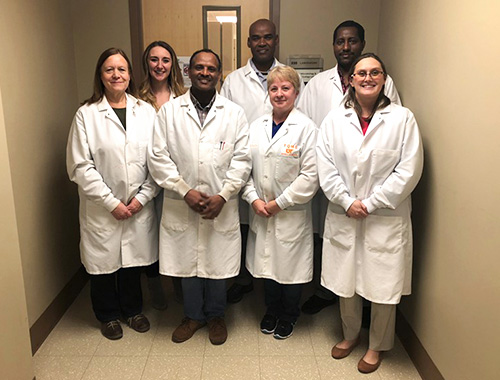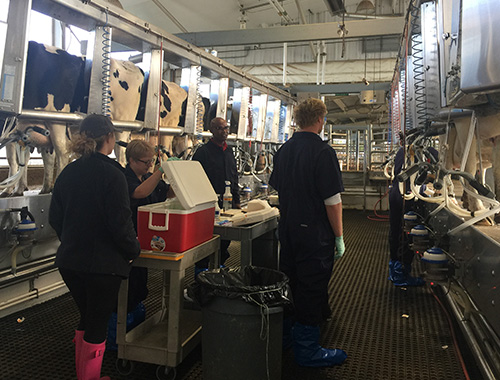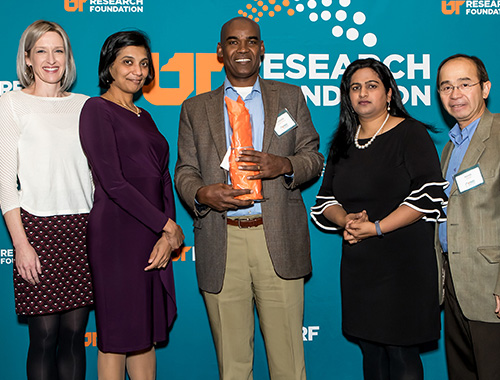 A Tenacious Search for a Mastitis Vaccine
A Tenacious Search for a Mastitis Vaccine
Assistant Professor of Animal Science Oudessa Kerro Dego is on the cusp of developing a groundbreaking effective vaccine to control mastitis in farm animals, especially dairy cattle. Mastitis, an inflammation of the mammary gland, is one of the most common diseases of dairy cattle, mainly caused by Staphylococcus, Streptococcus and coliform bacteria. These bacteria can also infect humans who consume unpasteurized milk. As a result, a mastitis vaccine would be life changing not only for American dairy farmers but also for people and their families across the world. No one knows this more personally than Oudessa.
 Oudessa was born in the East African country of Ethiopia. His father herded a large number of livestock (cattle, sheep, goats, and camels) that the family depended on for their livelihood. Very close with his father, Oudessa grew up learning the intricacies of caring for these animals and managing their production. Though cautious to quickly prevent all infectious diseases that kill a large number of animals, the family took special care to avoid infections of the mammary glands.
Oudessa was born in the East African country of Ethiopia. His father herded a large number of livestock (cattle, sheep, goats, and camels) that the family depended on for their livelihood. Very close with his father, Oudessa grew up learning the intricacies of caring for these animals and managing their production. Though cautious to quickly prevent all infectious diseases that kill a large number of animals, the family took special care to avoid infections of the mammary glands.
“We depended on animal products for a living, so milk was everything,” Odessa commented. “Mastitis is a major problem for milk production, both in quality and quantity. So that was the one thing I wanted to study.”
After completing secondary school, Oudessa joined Addis Ababa University in Ethiopia where he received his Doctor of Veterinary Medicine. From there, he headed to the Netherlands for a master’s in animal pathology at Utrecht University, then to Canada for his PhD in veterinary microbiology at the University of Saskatchewan’s Western College of Veterinary Medicine. Upon completion of his PhD in 2008, Oudessa came to the University of Tennessee to continue his mastitis research as a postdoctoral research associate before joining the faculty in 2015.


Oudessa’s research focuses on developing an effective vaccine that prevents bacterial growth in the mammary glands. Cows are most susceptible to disease of the mammary glands at two time points during the lactation cycle: when lactation begins after birth and when milking ceases roughly 300 days later. Infections occur when bacteria enter the teat opening, either during the milking process or from the environment. These infections shut down milk production, which is harmful to both the cow and the cattle farmer. Cows whose infections cannot be cured by antibiotic treatment before ending lactation are most often culled.
“Our goal is to give the cow a defense mechanism,” Odessa explains, “to attack and kill bacteria as soon as they get in and before they can do any damage to milk producing glands or to the cow.”
When a vaccine works, drug resistance is not a concern because the bacteria are killed by the animal’s body defense.
 In initial controlled experimental tests, Oudessa’s mastitis vaccine showed promising results, protecting 50–60% of vaccinated cows from infection compared with unvaccinated cows. Next up: the field study phase. Currently, Oudessa is working with UTRF to secure funding for a field study, which includes acquiring and vaccinating a large number of cows, then examining the resulting levels of protection from natural exposure to mastitis-causing bacteria. He’s hoping to begin the field-based vaccination process this fall and monitor results for a year before determining conclusive outcomes.
In initial controlled experimental tests, Oudessa’s mastitis vaccine showed promising results, protecting 50–60% of vaccinated cows from infection compared with unvaccinated cows. Next up: the field study phase. Currently, Oudessa is working with UTRF to secure funding for a field study, which includes acquiring and vaccinating a large number of cows, then examining the resulting levels of protection from natural exposure to mastitis-causing bacteria. He’s hoping to begin the field-based vaccination process this fall and monitor results for a year before determining conclusive outcomes.
“The implications of this potential mastitis vaccine cannot be overstated,” said Nghia Chiem, UTRF licensing associate. “We can’t wait to see what Oudessa’s research accomplishes in this next stage of study, and we’re proud to be his partner in developing this life-changing vaccine and delivering it to the world.”